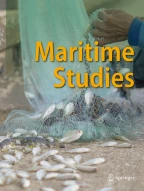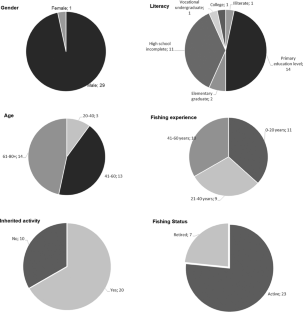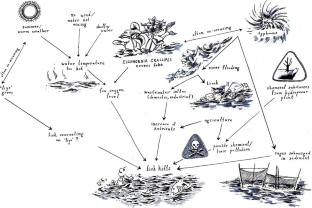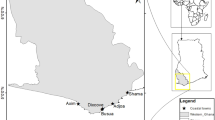Fishers’ Perspectives: the Drivers Behind the Decline in Fish Catch in Laguna Lake, Philippines

Aquatic ecosystems are strongly affected by global change. Fishers hold local ecological knowledge (LEK) that is especially relevant for improving our understanding of aquatic ecosystems that experience major environmental changes while also providing crucial ecosystem services. This research explores the perceptions of the ecological changes in Laguna Lake (Philippines) among local fisherfolks. In 2019, we conducted 30 semi-structured interviews with fisherfolks with up to 60 years’ experience. They reported catching 31 fish species and one shrimp genus as a staple food and income source, with more than one-third of the species being exotic or introduced. The fisherfolks noted repeated fish kill events and dramatic changes in their catch such as fewer and smaller fish. Also noticeable were the widespread catch of knifefish, a comparably newly introduced species, and the fact that all native fish species were reported to be less often caught now than in the past. This included the reduced catch of talilong (mullet), dalag (snakehead), and ayungin (silver perch). Locals emphasized various drivers behind these changes, which are linked to one another in complex interrelationships. Invasive species, the deterioration of fish habitats, and increased water turbidity were cited as the main drivers. Interviewees highlighted an additional link between declining catches and the loss of aquatic plant diversity, which has been understudied in Laguna Lake and has not been the focus of regional policy efforts. The empirical evidence provided by the fisherfolks enhances earlier existing scientific evidence of this aquatic ecosystem as well as highlights the importance of contributions coming from different knowledge systems.
This is a preview of subscription content, log in via an institution to check access.
Access this article
Subscribe and save
Springer+ Basic
€32.70 /Month
- Get 10 units per month
- Download Article/Chapter or eBook
- 1 Unit = 1 Article or 1 Chapter
- Cancel anytime
Buy Now
Price includes VAT (France)
Instant access to the full article PDF.
Rent this article via DeepDyve




Similar content being viewed by others

Local Ecological Knowledge, Catch Characteristics, and Evidence of Elasmobranch Depletions in Western Ghana Artisanal Fisheries
Article 25 November 2022

Fisheries and Socio-economic Change in the Thanlwin River Estuary in Mon and Kayin State, Myanmar
Chapter © 2019

Inferring Recent Changes in Fish Fauna in the Middle Reaches of the Kampar River: Survey Results from the Fishing Village of Rantau Baru
Chapter © 2023
References
- Albert, J.S., G. Destouni, S.M. Duke-Sylvester, A.E. Magurran, T. Oberdorff, R.E. Reis, K.O. Winemiller, and W.J. Ripple. 2021. Scientists’ warning to humanity on the freshwater biodiversity crisis. Ambio 50(1): 85–94.https://doi.org/10.1007/s13280-020-01318-8
- Anon. 2012. 17 indigenous fish species in Laguna Lake extinct, say fisherfolk. https://ph.news.yahoo.com/17-indigenous-fish-species-laguna-lake-extinct-fisherfolk-080736615.html. Accessed 18 April 2021.
- Aquino, L. M. G., J. M. Tango, R. J. C. Canoy, I. K. C. Fontanilla, Z. U. Basiao, P. S. Ong, and J. P. Quilang. 2011. DNA barcoding of fishes of Laguna de Bay, Philippines. Mitochondrial DNA 22(4): 143–53. https://doi.org/10.3109/19401736.2011.624613
- Archer, L. J., S.K. Papworth, C.M. Apale, D.B. Corona, J.T. Gacilos, R. L. Amada, C. Waterman, S.T. Turvey. 2020. Scaling up local ecological knowledge to prioritise areas for protection: determining Philippine pangolin distribution, status and threats. Global Ecology and Conservation 24: e01395.https://doi.org/10.1016/j.gecco.2020.e01395
- Ayanda, O. I., T. Ajayi, and F. P. Asuwaju. 2020. Eichhornia crassipes (Mart.) Solms: uses, challenges, threats, and prospects. The Scientific World Journal 2020: 3452172. https://doi.org/10.1155/2020/3452172
- Azzurro, E., V. Sbragaglia, J. Cerri, M. Bariche, L. Bolognini, J. Ben Souissi, G. Busoni, S. Coco, A. Chryssanthi, E. Fanelli, R. Ghanem, J. Garrabou, F. Gianni, F. Grati, J. Kolitari, G. Letterio, L. Lipej, C. Mazzoldi, N. Milone, F. Pannacciulli, A. Pešić, Y. Samuel‐Rhoads, L. Saponari, J. Tomanic, N. Eda Topçu, G. Vargiu, and P. Moschella. 2019. Climate change, biological invasions, and the shifting distribution of Mediterranean fishes: a large‐scale survey based on local ecological knowledge. Global Change Biology 25(8): 2779–2792. https://doi.org/10.1111/gcb.14670
- Béné, C., R. Arthur, H. Norbury, E.H. Allison, M. Beveridge, S. Bush, L. Campling, W. Leschen, D. Little, D. Squires, S.H. Thilsted, M. Troell, and M. Williams. 2016. Contribution of fisheries and aquaculture to food security and poverty reduction: assessing the current evidence. World Development 79: 177–196. https://doi.org/10.1016/j.worlddev.2015.11.007
- Berkes, F., J. Colding, and C. Folke. 2000. Rediscovery of traditional ecological knowledge as adaptive management. Ecological Applications 10: 1251–1262. https://doi.org/10.1890/1051-0761(2000)010[1251:ROTEKA]2.0.CO;2. ArticleGoogle Scholar
- Berkström, C., M. Papadopoulos, N.S. Jiddawi, and L.M. Nordlund. 2019. Fishers’ local ecological knowledge (LEK) on connectivity and seascape management. Front: Mar. Sci. https://doi.org/10.3389/fmars.2019.00130. BookGoogle Scholar
- BFAR. 2014. https://www.bfar.da.gov.ph/aboutUS Accessed 19 Sept 2021.
- Blanco, A. C., M. Amihan, R. Jalbuena, K. Ticman, J. M. Medina, E. Gubatanga, A. Santos, R. Sta. Ana, E. Herrera, and K. Nadaoka. 2019. Estimation of CHL-A concentration in Laguna Lake Sentinel-3 Olci Images. https://www.int-arch-photogramm-remote-sens-spatial-inf-sci.net/XLII-3-W11/17/2020/isprs-archives-XLII-3-W11-17-2020.pdf Accessed 18 April 2021.
- Boquet, Y. 2017. Spatial structures of the Philippines: Urbanization and regional inequalities. In The Philippine Archipelago, 419–464. Cham: Springer. ChapterGoogle Scholar
- Braga, H. O., M. Â. P. Cruz, R. C. M. da Cruz, T. C. Alvarenga, and U. M. Azeiteiro. 2018. Fishers’ knowledge in Southeast Brazil: the case study of the Brazilian sardine. Ocean & Coastal Management 165: 141–153. https://doi.org/10.1016/j.ocecoaman.2018.08.021
- Castro, J. M., M. Camacho, & J. C. Gonzales. 2018. Reproductive Biology of Invasive Knifefish (Chitala ornata) in Laguna de Bay, Philippines and its Implication for Control and Management. Asian Journal of Conservation Biology. https://www.ajcb.in/journals/full_papers_dec_2018/AJCB-Vol7-No2-Castro%20et%20al.pdf
- Cavole, L. M., S. Andrade-Vera, J. R. Marin Jarrin, D. Faggiani Dias, O. Aburto-Oropeza, M. J. Barrágan-Paladines. 2020. Using local ecological knowledge of Fishers to infer the impact of climate variability in Galápagos’ small-scale fisheries. Marine Policy 121: 104195. https://doi.org/10.1016/j.marpol.2020.104195
- Chan. M.N., A. H. Beaudreau, and P. A. Loring. 2019. Exploring diversity in expert knowledge: variation in LEK of Alaskan recreational and subsistence fishers. ICES Journal of Marine Science 76(4): 913–924. https://doi.org/10.1093/icesjms/fsy193
- Charnley, S. A., P. Fischer, and E. T. Jones. 2007. Integrating traditional and local ecological knowledge into forest biodiversity conservation in the Pacific Northwest. Forest ecology and managementhttps://doi.org/10.1016/j.foreco.2007.03.047
- Cinco, M. 2021. Program for Laguna de Bay good, but fishers feel forgotten. Philippine Daily Inquirer, July 25.https://newsinfo.inquirer.net/1463849/program-for-laguna-de-bay-good-but-fishers-feel-forgotten. Accessed 19 March 2022.
- Concepcion, R., and G. Nilo, 2019. Law and policy to manage land degradation in the Philippines. In: . Response to Land Degradation, eds. Bridges EM, Hannam ID, Oldeman LR, de Vries FWTP, Scherr SJ, Sombatpanit S. 404–414, Taylor & Francis Group.
- Cook, C., and R. Lüönd. 1982. A revision of the genus Hydrilla (Hydrocharitaceae). Aquatic Botany 13: 485–504. https://doi.org/10.1016/0304-3770(82)90074-2. ArticleGoogle Scholar
- Crona, B.I. 2006. Supporting and enhancing development of heterogeneous ecological knowledge among resource users in a Kenyan seascape. Ecology and Society 11: 32. https://doi.org/10.5751/ES-01712-110132. ArticleGoogle Scholar
- Cuvin-Aralar, M. L., A. E. Santiago, A. C. Gonzal, C. B. Santiago, M. R. Romana-Eguia, S. F. Baldia, & F. Palisoc Jr. 2001. Incidence and causes of mass fish kill in a shallow tropical eutrophic lake (Laguna de Bay, Philippines). In 9th International Conference on the Conservation and Management of Lakes. Conference proceedings, 233–236. Shiga, Japan: Shiga Prefectural Government.
- Cuvin-Aralar, L. M., U. Focken, K. Becker, and E. V. Aralar. 2004. Effects of low nitrogen-phosphorus ratios in the phytoplankton community in Laguna de Bay, a shallow eutrophic lake in the Philippines. Aquatic Ecology 38: 387–401.https://doi.org/10.1023/B:AECO.0000035174.35091.0b
- da Costa, J.B., S. Rodgher, L.A. Daniel, and E.L. Espíndola. 2014. Toxicity on aquatic organisms exposed to secondary effluent disinfected with chlorine, peracetic acid, ozone and UV radiation. Ecotoxicology. https://doi.org/10.1007/s10646-014-1346-z. ArticleGoogle Scholar
- Delmendo. M.N. 1966. An evaluation of the fishery resources of Laguna de Bay. The Philippine Journal of Fisheries.http://www.nfrdi.da.gov.ph/tpjf/vol14_2/pp213-231.php
- Deshpande, P.C., H. Brattebø, A. M. Fet. 2019. A method to extract fishers’ knowledge (FK) to generate evidence for sustainable management of fishing gears. MethodsX 6: 1044–1053.https://doi.org/10.1016/j.mex.2019.05.008
- Directions for the Future. https://documents1.worldbank.org/curated/en/794191468096002510/pdf/361070PH0Natur1ver0P07533901PUBLIC1.pdf. Accessed 1 July 2021.
- Eckert, L. E., N. C. Ban, A. Frid, M. McGreer. 2017. Diving back in time: extending historical baselines for yelloweye rockfish with Indigenous knowledge. Aquatic Conservation: Marine and Freshwater Ecosystems 28(1): 158–166. https://doi.org/10.1002/aqc.2834
- FAO. 2020. The State of World Fisheries and Aquaculture 2020. Rome: In brief. Sustainability in action. Google Scholar
- FAO. 2012. Aquatic plants. Their uses and risks. A review of the global status of aquatic plants. http://www.fao.org/3/ca9051en/CA9051EN.pdf. Accessed 4 July 2021.
- Faraco, L.F., J.M. Andriguetto Filho, T. Daw, P.D. Lana, and C.F. Teixeira. 2016. Vulnerability among fishers in Southern Brazil and its relation to marine protected areas in a scenario of declining fisheries. Desenvolvimento e Meio Ambiente 38: 51–76. ArticleGoogle Scholar
- FishBase. n.d. https://www.fishbase.se. Accessed 21 December 2020.
- Fortes, R.D., 1995. Management options for sustainable development of Laguna de Bay. In Lake Fisheries Management in the Philippines. Proceedings of the National Symposium-Workshop on Lake Fisheries Management. 1993 Oct 28–29, eds. Edra, R.B., E.V. Manalili, and R.D. Guerrero III. Los Baños, Laguna: Philippine Council for Aquatic and Marine Resources Research and Development (PCAMRRD).
- Galang, E. I. N. E., and P. Vaughter, 2020. Generational local ecological knowledge on the benefits of an agroforestry landscape in Mindanao, Philippines. Asian Journal of Agriculture and Development.https://doi.org/10.37801/ajad2020.17.1.6
- Gallardo, B., M. Clavero, M. I. Sánchez, M. Vilà. 2016. Global ecological impacts of invasive species in aquatic ecosystems. Global Change Biology 22(1): 151–63. https://doi.org/10.1111/gcb.13004
- Gangstad, E. O.1976. Potential growith of aquatic plants in the Republic of the Philippines and projected methods of control. http://www.apms.org/japm/vol14/v14p10.pdf. Accessed 18 April 2021.
- Guerrero, R.D.I.I.I. 2014. Impacts of introduced freshwater fishes in the philippines (1905–2013): A review and recommendations. Philippine Journal of Science 143 (1): 49–59. Google Scholar
- Häder, D. P. and P. W. Barnes. 2019. Comparing the impacts of climate change on the responses and linkages between terrestrial and aquatic ecosystems. Science of the Total Environment 682: 239–246. https://doi.org/10.1016/j.scitotenv.2019.05.024
- Häder, D. P., A. T. Banaszak, V. E. Villafañe, M. A. Narvarte, R. A. González and E. Walter Helbling. 2020. Anthropogenic pollution of aquatic ecosystems: emerging problems with global implications. Science of the Total Environmenthttps://doi.org/10.1016/j.scitotenv.2020.136586
- Harper, S., C. Grubb, M. Stiles, and U.R. Sumaila. 2017. Contributions by women to fisheries economies: Insights from five maritime countries. Coastal Management 45 (2): 91–106. https://doi.org/10.1080/08920753.2017.1278143. ArticleGoogle Scholar
- Harrison, H.L., S. Rybråten, and Ø. Aas. 2018. Hatching knowledge: A case study on the hybridization of local ecological knowledge and scientific knowledge in small-scale Atlantic salmon (Salmo salar) cultivation in Norway. Human Ecology 46 (4): 449–459. ArticleGoogle Scholar
- Herrera, E., K. Nadaoka, A. Blanco, and E. Hernandez. 2015. Hydrodynamic investigation of a shallow tropical lake environment (Laguna Lake, Philippines) and associated implications for eutrophic vulnerability. ASEAN Engineering Journal 4 (1). https://doi.org/10.11113/aej.v4.15432
- Hill, R., C. Adem, W. V. Alangui, Z. Molnár, Y. Aumeeruddy-Thomas, P. Bridgewater, M. Tengö, R. Thaman, C.Y. Adou Yao, F. Berkes, J. Carino, M. Carneiro da Cunha, M.C. Diaw, S. Díaz, V. E. Figueroa, J. Fisher, P. Hardison, K. Ichikawa, P. Kariuki, M. Karki, P. OB. Lyver, P. Malmer, O. Masardule, A. A. Oteng Yeboah, D. Pacheco, T. Pataridze, E. Perez, M.-M. Roué, H. Roba, J. Rubis, O. Saito, D. Xue. 2020. Working with Indigenous, local and scientific knowledge in assessments of nature and nature’s linkages with people. Current Opinion in Environmental Sustainability 43: 8–20. https://doi.org/10.1016/j.cosust.2019.12.006
- IPBES. 2012. Functions, operating principles and institutional arrangements of the Intergovernmental Science-Policy Platform on Biodiversity and Ecosystem Services. https://ipbes.net/sites/default/files/downloads/functions_operating_principles_and_institutional_arrangements_of_ipbes_2012.pdf. Accessed 1 July 2021.
- ISE Code of Ethics. 2006. The ISE Code of Ethics. https://www.ethnobiology.net/what-we-do/core-programs/ise-ethics-program/code-of-ethics/. Accessed 21 Dec 2020.
- Israel, D.C. 2008. Fishpen and fishcage culture in Laguna de Bay: status, economic importance, and the relative severity of problems affecting its practice. Philippine Journal of Development 64 (1).
- IUCN Red List. 2021. The IUCN Red List of threatened species. https://www.iucnredlist.org/ Accessed 18 April 2021.Jiménez Cisneros, B.E., T. Oki, N.W. Arnell, G. Benito, J.G. Cogley, P. Döll, T. Jiang, and S.S. Mwakalila. 2014: Freshwater resources. In: Climate Change 2014: Impacts, Adaptation, and Vulnerability. Part A: Global and Sectoral Aspects. Contribution of Working Group II to the Fifth Assessment Report of the Intergovernmental Panel on Climate Change, eds. Field, C.B., V.R. Barros, D.J. Dokken, K.J. Mach, M.D. Mastrandrea, T.E. Bilir, M. Chatterjee, K.L. Ebi, Y.O. Estrada, R.C. Genova, B. Girma, E.S. Kissel, A.N. Levy, S. MacCracken, P.R. Mastrandrea, and L.L.White, 229–269. Cambridge University Press, Cambridge, United Kingdom and New York, NY, USA.
- Jones, K.R., C.J. Klein, B.S. Halpern, O. Venter, H. Grantham, C.D. Kuempel, N. Shumway, A.M. Friedlander, H.P. Possingham, and J.E.M. Watson. 2018. The location and protection status of Earth’s diminishing marine wilderness. Current Biology 28(15): 2506–2512.e3. https://doi.org/10.1016/j.cub.2018.06.010
- Joshi, R.C. 2006. Invasive alien species (IAS): concerns and status in the Philippines. https://www.fftc.org.tw/htmlarea_file/activities/20110826121346/paper-729213301.pdf. Accessed 4 July 2021.
- Lacanilao, F. 1987. Managing Laguna lake for the small fishermen. SEAFDEC Asian Aquaculture 9 (3): 3–4. Google Scholar
- Le Fur, J., A. Guilavogui, A. Teitelbaum, and M.-J. Rochet. 2011. Contribution of local fisherfolks to improving knowledge of the marine ecosystem and resources in the Republic of Guinea. West Africa: Can. J. Fish. Aquat. Sci. https://doi.org/10.1139/f2011-061. BookGoogle Scholar
- Legaspi, K.A.Y., A. Lau, P. Jordan, A. Mackay, S. Mcgowan, G. Mcglynn, S. Baldia, R.D. Papa, and D. Taylor. 2015. Estab-lishing the impacts of freshwater aquaculture in tropical Asia: the potential role of palaeo-limnology. Geo: Geography and Environment. Google Scholar
- LLDA. n.d.b. Biodiversity. https://llda.gov.ph/biodiversity/. Accessed 18 March 2022.
- LLDA. 2018. BOARD RESOLUTION NO. 540 Series of 2018. https://law.upd.edu.ph/wp-content/uploads/2020/07/LLDA-BR-No-540-Series-of-2018.pdf. Accessed 4 September 2021.
- LLDA. 2018a. Annual Report 2018. Draft. https://llda.gov.ph/wp-content/uploads/2019/10/ar18.pdf. Accessed 4 September 2021.
- LLDA. 2018b. Lake Watch The Official Newsletter of Laguna Lake Development Authority. https://llda.gov.ph/wp-content/uploads/dox/lake-watch/lake-watch-v1-2018c.pdf
- LLDA. 2019a. Annual Report 2019. https://llda.gov.ph/wp-content/uploads/dox/ar/ar19.pdf. Accessed 11 August 2021.
- LLDA. 2019b. BOARD RESOLUTION NO. 561 Series of 2019. https://law.upd.edu.ph/wp-content/uploads/2020/08/LLDA-BR-No-561-Series-of-2019b.pdf. Accessed 4 September 2021.
- LLDA official web page. n.d. Babala sa Pagdami ng Liya sa Lawa ng Laguna. https://llda.gov.ph/babala-sa-pagdami-ng-liya-sa-lawa-ng-laguna/. Accessed 18 April 2021.
- Macusi, E.D., N.A.S. Abreo, and R.P. Babaran. 2017. Local ecological knowledge (LEK) on fish behavior around anchored FADs: the case of tuna purse seine and ringnet fishers from Southern Philippines. Front: Mar. Sci. https://doi.org/10.3389/fmars.2017.00188. BookGoogle Scholar
- Mamun, AA. 2010. Understanding the value of local ecological knowledge and practices for habitat restoration in human-altered floodplain systems: a case from Bangladesh. Environmental Management 45(5): 922–38. https://doi.org/10.1007/s00267-010-9464-8
- Martins, I., R. Machado, P. Medeiros, M. Di Domenico, and N. Hanazaki. 2018. What fishers’ local ecological knowledge can reveal about the changes in exploited fish catches. Fisheries Research 198: 109–116. https://doi.org/10.1016/j.fishres.2017.10.008
- Masuda, T. 2019. Interactive governance for sustainable resource use and environmental management: a case study of Yaman ng Lawa Initiative in the Laguna Lake Watershed, Philippines. In Interactive Approaches to Water Governance in Asia, ed. Otsuka, K. Singapore: Springer.
- Masuda, T. 2021. Interactive governance and community activities for sustainable resource use and environmental management: “Yaman ng Lawa (Blessings of the Lake)” initiative in the Laguna Lake Watershed, Philippines and its implications. Journal of Rural Problems 57(1).
- Mazumdar, S., L. Ceccaroni, J. Piera, F. Hölker, A. J. Berre, R. Arlinghaus, A. Bowser. 2018. Citizen science technologies and new opportunities for participation. Pages 303–320 In: Citizen Science: Innovation in Open Science, Society and Policy, eds. Hecker, S., M. Haklay, A. Bowser, Z. Makuch, J. Vogel, and A. Bonn, 303–320. London: UCL Press.
- McCabe, A., R. Parker, T. Osegowitsch, and S. Cox. 2021. Overcoming barriers to knowledge co-production in academic-practitioner research collaboration, European Management Journal. ISSN 0263-2373https://doi.org/10.1016/j.emj.2021.11.009
- De Medeiros, P., A. Almeida, R. Lucena, F. Souto, and U. Albuquerque. 2014. Use of visual stimuli in ethnobiological research. Methods and Techniques in Ethnobiology and Ethnoecology. pp.87–98. https://doi.org/10.1007/978-1-4614-8636-7_6
- Mendoza, J.N., G. Mattalia, B. Prūse, S. Kochalski, A. Ciriaco, A. Pieroni, and R. Sõukand. 2021. “Wild fish are a blessing”: Changes in fishing practices and folk fish cuisine around Laguna Lake. Northern Philippines. Journal of Ethnic Foods 8: 31. https://doi.org/10.1186/s42779-021-00106-3. ArticleGoogle Scholar
- Mistry, J., and A. Berardi. 2016. Bridging indigenous and scientific knowledge. Science. https://doi.org/10.1126/science.aaf1160. ArticleGoogle Scholar
- Moyle P.B., and R.A. Leidy 1992. Loss of biodiversity in aquatic ecosystems: evidence from fish faunas. In: Conservation Biology, eds. Fiedler P.L., and S.K. Jain. Boston, MA: Springer. https://doi.org/10.1007/978-1-4684-6426-9_6
- Müller, J.G., R. Boubacar, & I.D. Guimbo. 2015. The “how” and “why” of including gender and age in ethnobotanical research and community-based resource management. AMBIOhttps://doi.org/10.1007/s13280-014-0517-8
- Murphy, K.J. 1988. Aquatic weed problems and their management: A review. I. The worldwide scale of the aquatic weed problem. Crop Protection 7: 232–248. ArticleGoogle Scholar
- Mustonen, T., and N. Huusari. 2020. How to know about waters? Finnish traditional knowledge related to waters and implications for management reforms. Reviews in Fish Biology and Fisheries 30: 699–718. https://doi.org/10.1007/s11160-020-09619-7. ArticleGoogle Scholar
- Nauta, T.A., A.E. Bongcob, and A.C. Santos-Borja. 2003. Set-up of a decision support system to support sustainable development of the Laguna de Bay. Philippines: Marine Pollution Bulletin. https://doi.org/10.1016/S0025-326X(02)00407-1. BookGoogle Scholar
- Palanca-Tan, R. 2020. Benefits from Laguna Lake: perspective of small fisher households. Journal of Management for Global Sustainability 8(2): 11–35. https://doi.org/10.13185/JM2020.08202.
- Palma, A. L., A. S. Diamante, and R. M. Pol. 2002. An assessment of fishery resources of Laguna de Bay. Aquatic Ecosystem Health & Management 5(2): 139–146. https://doi.org/10.1080/14634980290031802
- Pamalakaya-Pilipinas. 2017. LLDA, DENR Laguna Lake rehab plan a hypocritical solution – fisherfolk group. https://pamalakayaweb.wordpress.com/2017/12/04/llda-denr-laguna-lake-rehab-plan-a-hypocritical-solution-fisherfolk-group/. Accessed 27 July 2021.
- Paterno, R. P. P., MD, MPH , J. Z. Galvez Tan, MD, MPH, L. A. Palapar, MD, MPH, A. N. C. Bermudez, MD, MPH, A. J. B. Guiang, RN. n.d. The Yaman ng Lawa (Blessings of the Lake) Initiative in Santa Rosa City, Laguna, Philippines: an inclusive, participatory approach to public policy development. https://www.pref.ibaraki.jp/soshiki/seikatsukankyo/kasumigauraesc/04_kenkyu/kaigi/docments/kosyou/15/2014wlc_ramon_pedrop_p_paterno.pdf. Accessed 18 April 2021.
- BFAR. n.d. Philippine Fisheries Code of 1998. https://www.bfar.da.gov.ph/lawAndRegulation.jsp?id=2#post. Accessed 4 Sept 2021.
- Philippines MA. 2005. Ecosystems and people: the Philippine Millennium Ecosystem Assessment (MA) Sub-Global Assessment. https://www.millenniumassessment.org/documents_sga/Philippine%20SGA%20Report.pdf. Accessed 18 April 2021.
- Plants of the World. 2017.Plants of the World online,http://www.plantsoftheworldonline.org/. Accessed 14 September 2021.
- Reid, A.J., A. K. Carlson, I.F. Creed, E.J. Eliason, P.A. Gell, P.T.J. Johnson, K.A. Kidd, T.J. MacCormack, J.D. Olden, S.J. Ormerod, J.P. Smol, W.W. Taylor, K. Tockner, J.C. Vermaire, D. Dudgeon, and S.J. Cooke. 2019. Emerging threats and persistent conservation challenges for freshwater biodiversity. Biological Reviews of the Cambridge Philosophical Society 94(3): 849–873. https://doi.org/10.1111/brv.12480
- Reid, A. J., Eckert, L. E., Lane, J. F., Young, N., Hinch, S. G., Darimont, C. T., . and Marshall, A. 2021. “Two‐Eyed Seeing”: an Indigenous framework to transform fisheries research and management. Fish and Fisheries 22(2): 243–261
- Reyes-García, V., Á. Fernández-Llamazares, Y. Aumeeruddy-Thomas, et al. 2021. Recognizing Indigenous peoples’ and local communities’ rights and agency in the post-2020 Biodiversity Agenda. Ambio 51(1): 84–92. https://doi.org/10.1007/s13280-021-01561-7
- Saguin, K. 2019. “Return the Lake to the People”: Populist political rhetoric and the fate of a resource frontier in the Philippines. Annals of the American Association of Geographers 109 (2): 434–442. https://doi.org/10.1080/24694452.2018.1483815. ArticleGoogle Scholar
- Saguin, K. 2015. Blue revolution in a commodity frontier: ecologies of aquaculture and agrarian change in Laguna Lake, Philippines. Journal of Agrarian Change 16(4): 571–593. https://doi.org/10.1111/joac.12114
- Salvacion, A.R. 2020. Spatial pattern and determinants of village level poverty in Marinduque Island. Philippines: GeoJournal. https://doi.org/10.1007/s10708-018-9944-6. BookGoogle Scholar
- Santos-Borja, A., and D. N. Nepomuceno. 2006. Laguna De Bay: institutional development and change for lake basin management. Lakes and Reservoirs Research & Management Journal 11(4): 257–269. https://doi.org/10.1111/j.1440-1770.2006.00310.x
- Santos-Borja, A.C. 1994. The control of saltwater intrusion into Laguna de Bay: socioeconomic and ecological significance. Lake and Reservoir Management 10(2): 213–219. https://doi.org/10.1080/07438149409354192
- Sedlak, D.L., and U. von Gunten. 2011. Chemistry. The chlorine dilemma. Science 331(6013): 42–3. https://doi.org/10.1126/science.1196397
- Silva, H. C. H., R. L. F. Caraciolo, L. C. Marangon, M. A. Ramos, L. L. Santos, & U. P. Albuquerque. 2014. Evaluating different methods used in ethnobotanical and ecological studies to record plant biodiversity. Journal of Ethnobiology and Ethnomedicine 10: 48. https://doi.org/10.1186/1746-4269-10-48
- Silvano, R., and J. Valbo-Jørgensen. 2008. Beyond fishermen’s tales: Contributions of fishers’ local ecological knowledge to fish ecology and fisheries management. Environment Development and Sustainability. 10: 657–675. https://doi.org/10.1007/s10668-008-9149-0. ArticleGoogle Scholar
- Tamayo-Zafaralla, M., R.A.V. Santos, R.P. Orozco, and G.C.P. Elegado. 2002. The ecological status of lake Laguna De Bay. Philippines: Aquatic Ecosystem Health and Management Journal. https://doi.org/10.1080/14634980290031820. BookGoogle Scholar
- Tamayo-Zafaralla, M. 2017. Star Science: Saving Laguna de Bay 2. The Philippine Star. https://www.philstar.com/business/science-and-environment/2017/02/09/1670267/starscience-saving-laguna-de-bay-2
- The Laguna de Bay Ecosystem Health Report Card. 2013. http://pemsea.org/publications/reports/laguna-de-bay-2013-ecosystem-health-report-card. Accessed 21 December 2020.
- Thomas, E., I. Vandebroek, P. Van Damme. 2007. What works in the field? A comparison of different interviewing methods in ethnobotany with special reference to the use of photographs. Economic Botany 61: 376. https://doi.org/10.1663/0013-0001(2007)61[376:WWITFA]2.0.CO;2
- Tuble, D. 2013. Reclaiming Laguna Lake’s glory. https://www.healthfuturesfoundation.com/reclaiming-laguna-lakes-glory. Accessed 18 April 2021.
- UNESCO. n.d. Local and indigenous knowledge A timeline. http://www.unesco.org/new/fileadmin/MULTIMEDIA/HQ/SC/pdf/LINKS_ex_04.pdf. Accessed 1 July 2021.
- UPLB. 2018. Science and policy forum pushes for Laguna de Bay restoration. https://uplb.edu.ph/research/science-and-policy-forum-pushes-for-laguna-de-bay-restoration. Accessed 11 March 2022.
- Vidal, D., P. Pita, J. Freire, R. Muiño. 2020. Understanding fisherfolks-scientist collaboration in Galician small-scale fisheries (NW Spain): validating a methodological toolbox through a process-oriented approach. In Collaborative Research in Fisheries, eds Holm P., Hadjimichael M., Linke S., Mackinson S, vol 22. MARE Publication Series. Springer, Cham. https://doi.org/10.1007/978-3-030-26784-1_5
- Watkins, C.H., R.S. Hammerschlag. 1984. The toxicity of chlorine to a common vascular aquatic plant. Water Research 18(8): 1037–1043.https://doi.org/10.1016/0043-1354(84)90256-2
- Woodley, K., and C. Gilsenan. 2019. Breaking down barriers to co-production between research teams and civil society organisations. In Studying Diversity, Migration and Urban Multiculture: Convivial Tools for Research and Practice, eds. Berg M.L., and M. Nowicka, 186–191. UCL Press. https://doi.org/10.2307/j.ctvfrxs30.16
- World Bank. 2003. Governance of Natural Resources in the Philippines: Lessons from the Past, Directions for the Future. https://documents1.worldbank.org/curated/en/794191468096002510/pdf/361070PH0Natur1ver0P07533901PUBLIC1.pdf. Accessed 1 July 2021.
- World Bank. 2018. Population growth (annual %) – Philippines. https://data.worldbank.org/indicator/SP.POP.GROW?locations=PH. Accessed 18 April 2021.
Acknowledgements
Special thanks are due to all the fishers of Mabato Asufre who generously shared their knowledge. We express our sincerely gratitude to the BFAR for their consultation regarding local names. We are very grateful to Agris Brauns for creating the map of the study area and to Dr Hannah Harrison for her comments on a first draft. Special thanks to artist Johanna Lohrengel for visualization of the mental map. SK received funding from the European Union’s Horizon 2020 research and innovation programme under the Marie Skłodowska-Curie grant agreement No. 896438.
Author information
Authors and Affiliations
- Tagalog Fisher Community of Mabato Asufre Pangil, Pangil, Laguna, Philippines Jimlea Nadezhda Mendoza
- Department of Environmental Sciences, Informatics and Statistics, Ca’ Foscari University of Venice, Venice, Italy Jimlea Nadezhda Mendoza, Baiba Prūse, Giulia Mattalia & Renata Sõukand
- CRETUS, University of Santiago de Compostela, Santiago, Spain Sophia Kochalski
- Kabulusan Integrated National High School, Pakil, Laguna, Philippines Aimee Ciriaco
- Jimlea Nadezhda Mendoza






